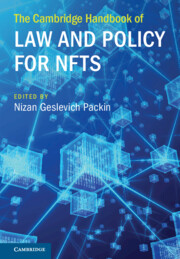Book contents
- The Cambridge Handbook of Law and Policy for NFTs
- The Cambridge Handbook of Law and Policy for NFTs
- Copyright page
- Dedication
- Contents
- Figures
- Tables
- Contributors
- Acknowledgments
- Part I Introduction and Background
- Part II Financial Regulation and Investor Protection
- 3 The Economic Reality of NFT Securities
- 4 Digital Assets, Anti-Money Laundering, and Counter Financing of Terrorism
- 5 NFTs and State Laws Governing Securities Regulation, Virtual Currency, and Money Transmission
- 6 New Tax-Reporting Rules for a New Class of Digital Assets?
- Part III Capital Markets, Community, and Marketing
- Part IV Intellectual Property and Ownership Rights
- Part V Data Protection, Privacy, Cybersecurity, and NFTs
- Part VI Other Legal Issues with NFTs
- Part VII Conclusions and Future Directions
- Index
5 - NFTs and State Laws Governing Securities Regulation, Virtual Currency, and Money Transmission
from Part II - Financial Regulation and Investor Protection
Published online by Cambridge University Press: 02 November 2024
- The Cambridge Handbook of Law and Policy for NFTs
- The Cambridge Handbook of Law and Policy for NFTs
- Copyright page
- Dedication
- Contents
- Figures
- Tables
- Contributors
- Acknowledgments
- Part I Introduction and Background
- Part II Financial Regulation and Investor Protection
- 3 The Economic Reality of NFT Securities
- 4 Digital Assets, Anti-Money Laundering, and Counter Financing of Terrorism
- 5 NFTs and State Laws Governing Securities Regulation, Virtual Currency, and Money Transmission
- 6 New Tax-Reporting Rules for a New Class of Digital Assets?
- Part III Capital Markets, Community, and Marketing
- Part IV Intellectual Property and Ownership Rights
- Part V Data Protection, Privacy, Cybersecurity, and NFTs
- Part VI Other Legal Issues with NFTs
- Part VII Conclusions and Future Directions
- Index
Summary
The market of non-fungible tokens (NFTs) is rapidly growing and their potential uses and applications are still being discovered. The rapid growth of this market, coupled with the unique nature of NFTs, which do not fit squarely within the existing regulatory frameworks, creates a regulatory gap between existing and effective regulation of NFTs. This gap, in turn, creates a policy-making dilemma: on the one hand, regulating NFTs too quickly could prevent efficient uses and applications from being discovered and deployed, thus stifling innovation. On the other, leaving NFTs unregulated could leave investors unprotected from the risks posed by this innovation. With this dilemma in mind, this chapter argues that regulation of NFTs should occur sparingly, and to the extent that it does occur, regulatory experimentation and competition emerges as the most promising approach. In the US, one place where regulatory competition exists is between and among the states. State regulation in the areas of securities and virtual currency and money transmission can be used to address some of the prominent present concerns posed by NFTs, such as frauds and money laundering, and states have the opportunity to experiment as NFTs evolve and are refined.
Keywords
- Type
- Chapter
- Information
- The Cambridge Handbook of Law and Policy for NFTs , pp. 103 - 117Publisher: Cambridge University PressPrint publication year: 2024

